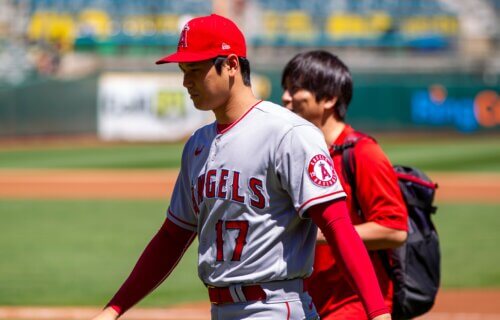The average person has five people in their life they feel they can trust. That number, though, has dwindled for Los Angeles Dodgers superstar Shohei Ohtani. Ippei Mizuhara, Ohtani’s former translator and confidante, is accused of stealing millions from the All-Star to pay off gambling debts. This brings up a very important question: how much trust does Ohtani have in his inner circle after this breach of security?
Trust is the foundation of our relationships with friends, family, and colleagues, and it was easy to see the trust Ohtani placed in Mizuhara. The two would become inseparable after Mizuhara became Ohtani’s interpreter in 2018 when Ohtani signed with the Los Angeles Angels.
“Mizuhara has interpreted for Ohtani since the star moved to the United States in 2018, accompanying the two-way player in dugouts, locker rooms, player lounges, on trips, in media settings and elsewhere, making Mizuhara highly recognizable to baseball fans,” ESPN’s Tisha Thompson wrote. “He has been the interpreter for Ohtani with team managers and coaches and goes over scouting reports with Ohtani during games. The two are rarely separated. Mizuhara runs errands for the pitcher, carries his water bottle and is so ever-present that an Ohtani teammate once referred to the duo as having a ‘brotherhood’ that goes beyond friendship.”
That trust was severed, though, after Mizuhara allegedly racked up at least $16 million in debt to a bookmaker in California. When reports began to surface that Ohtani’s bank account was associated in a federal investigation of the purported illegal bookmaker, Mizuhara began spinning multiple tales.
Ippei Mizuhara has been charged with stealing more than $16 million from Shohei Ohtani, according to federal investigators. https://t.co/t4R7QFlEMf
— Jeff Passan (@JeffPassan) April 11, 2024
In a March interview with ESPN, Mizuhara told the outlet that Ohtani initially paid off his gambling debt. However, he would later recant his comments, going on to say Ohtani didn’t know about the debt and that the two-time MVP did not wire money to the bookmaker. According to multiple reports, it appears Mizuhara was trying to keep Ohtani in the dark, as the baseball star would say the interpreter never told him what was happening.
The New York Times reports:
“Mizuhara, though, told Ohtani’s agent, Nez Balelo, that had discussed the matter with the player, according to Ohtani. But Mizuhara offered different versions to Balelo of what had occurred. First, Mizuhara said Ohtani had paid the debts of an unnamed teammate; then he said that he himself had racked up debts with the bookie and that Ohtani had bailed him out. The shifting stories alarmed executives in Major League Baseball, who worried that Ohtani might be tarnished by a connection to gambling.”
Ohtani allegedly first learned about the issue when Mizuhara addressed the Dodgers clubhouse, saying he had a gambling addiction and that Ohtani paid off his debts.
All of these runarounds and stories lead us to this point: who can Ohtani trust? How was Ohtani kept in the dark for so long? Can Ohtani still rely on his inner circle after this tumultuous time?
What Research Tells Us About Trusting Others
In an attempt to answer those questions, we have to look into what trust exactly is and what factors influence whether we trust someone or not. In a recent study published in Frontiers in Psychology, University of Central Florida researchers define trust as “an individual’s calculated exposure to the risk of harm from the actions of an influential other.” In other words, when we trust someone, we are making ourselves vulnerable based on our assessment of the potential risks vs rewards of that relationship.
Researchers identified three key buckets of factors that shape our trust:
- Factors related to the “trustor” — the person doing the trusting
- Factors related to the “trustee” — the person being trusted
- Contextual factors related to the specific situation and environment
On the trustor side, things like the person’s propensity to trust others in general, their personality, emotional state, and cognitive abilities all play a role. If you’re a naturally trusting person, you’re more likely to have faith in others compared to someone who is inherently more skeptical.
When it comes to the trustee, their perceived ability, benevolence, integrity, and overall trustworthiness are key. We put our confidence in people who we believe are competent, well-intentioned, and ethically sound. Factors like the person’s reputation, predictability, and transparency also come into play.
Finally, the context and environment surrounding the relationship matter a lot. In collaborative settings, a sense of shared group identity, strong communication, and cohesion increase trust. Conflict has the opposite effect, eroding those social bonds. Risk also plays an interesting role — we’re more willing to trust in lower-stakes situations than when the potential downside is severe.
A key takeaway from the study is that trust is a complex and multi-faceted phenomenon. It’s not just about the two people involved, but is highly dependent on the broader social context. University of Central Florida researchers also emphasize that trust is dynamic — it builds up or erodes over time based on our history of experiences with the other person or entity.
What It Means For Ohtani
Unfortunately, for Ohtani, he didn’t realize the risk of his “trustee” in Mizuhara before it was too late. Was Ohtani too gullible of a “trustor”? Possibly. Is there a way he can still fix that? Definitely.
Ohtani will need to have a sit-down talk with himself to reevaluate the people who are within his inner circle. His career and legacy were nearly tarnished because of one individual and the lack of communication with Ohtani, himself. Whether he needs to clean house or have serious conversations with his advisers, it ultimately lands on Ohtani where he can place his trust. He needs to be more involved with what’s happening around him rather than completely relying on one person.
